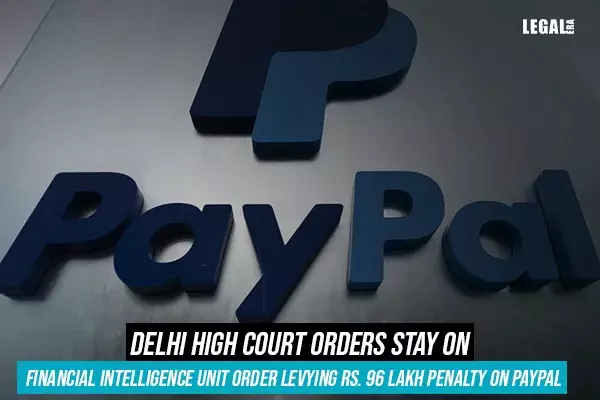Delhi High Court orders Stay on Financial Intelligence Unit order levying Rs. 96 lakh penalty on PayPal
The Delhi High Court on 12th January passed a stay order from imposing a penalty of Rupees Ninety-six lakh on payment;

Delhi HC orders Stay on Financial Intelligence Unit order levying Rs. 96 lakh penalty on PayPal The Delhi High Court on 12th January passed a stay order from imposing a penalty of Rupees Ninety-six lakh on payment service PayPal in the case of PayPal Payments Pvt Ltd. vs. Financial Intelligence Unit. The stay was pertaining to PayPal depositing a bank guarantee of the penalty amount with...
Delhi HC orders Stay on Financial Intelligence Unit order levying Rs. 96 lakh penalty on PayPal
The Delhi High Court on 12th January passed a stay order from imposing a penalty of Rupees Ninety-six lakh on payment service PayPal in the case of PayPal Payments Pvt Ltd. vs. Financial Intelligence Unit.
The stay was pertaining to PayPal depositing a bank guarantee of the penalty amount with the High Court and maintaining records of all its transactions. The order was passed by Justice Pratibha M Singh in PayPal's challenge to the penalty levied on it.
The penalty was levied on Paypal subject to default in not registering itself as 'reporting entity' under the Prevention of Money Laundering Act, 2002 (PMLA).
The Court while issuing notice in the matter, sought a response from the Financial Intelligence Unit, which is India's central agency responsible for processing information relating to suspect financial transactions, under the guidance of the Union Ministry of Finance.
PayPal in its plea contended that the Financial Intelligence Unit erroneously wrongly interpreted PMLA provisions against all settled principles of statutory interpretation. It claimed that the company functions as a payment intermediary and Online Payment Gateway Service Provider to its customers, and does not provide clearing, payment, money transfer or settlement services.
In addition to this, PayPal contended that it is not a 'financial institution' under Section 2(1)(l) of the PMLA, and therefore, cannot register as a reporting entity under Section 2(1) (wa) of the Act.
The petition stated, "the Respondent passed the Impugned Order, in complete derogation of the settled principles of law and statutory interpretation. The Impugned Order incorrectly holds that, by virtue of the activities being carried on by the Petitioner as a payment intermediary, the Petitioner is covered under the definition of "reporting entity" as under Section 2(l)(wa) of the PMLA."
Further it retaliated that the Financial Intelligence Unit's order runs contrary to the regulatory understanding of PayPal's business by the Reserve Bank of India (RBI) which has laid down the operational framework for the regulation and supervision of payment systems in India.
According to PayPal, the impugned order was additionally in violation of the principles of natural justice, as it was never given an opportunity to rebut certain findings made against it.
The matter has been listed to be heard next on 26 February, 2021.





